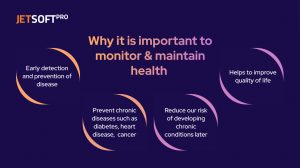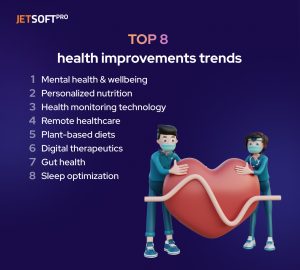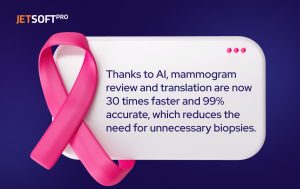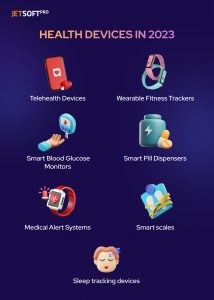The healthcare industry has experienced a rapid transformation in recent years, with new technologies and devices emerging to meet the growing demand for personalized and convenient healthcare services. As we look to the future, several health devices are poised to become even more popular in the coming years.
Importance of monitoring and maintaining health
Maintaining good health is one of the most important aspects of a happy and fulfilling life. It is a well-known fact that a healthy body and mind are key to overall well-being, productivity, and longevity. However, with the hectic pace of modern life and the many distractions that come with it, it can be easy to overlook the importance of monitoring and maintaining one’s health. We will explore the importance of monitoring and maintaining health and some practical tips to help you do so.

Firstly, monitoring and maintaining one’s health allows for early detection and prevention of disease. Regular check-ups, screenings, and health assessments can help identify health issues before they become serious or even life-threatening. This early detection can be critical in treating diseases effectively and preventing complications.
Secondly, maintaining good health through a healthy lifestyle can help prevent chronic diseases such as diabetes, heart disease, and some types of cancer. This includes maintaining a balanced and nutritious diet, engaging in regular exercise, getting enough sleep, managing stress, and avoiding risky behaviors such as smoking and excessive alcohol consumption.
Thirdly, maintaining good health can improve the quality of life. When we feel physically and mentally well, we are more likely to enjoy life to its fullest. Good health can lead to increased energy levels, improved mood, better cognitive function, and improved relationships.
Finally, maintaining good health is important for our future selves. Investing in our health today can reduce our risk of developing chronic conditions later in life and improve our chances of living a long and healthy life.
What health improvement trends to expect in 2023?
As we move into the future, there is a growing interest in health and wellness. With technological advancements, the health industry has seen several changes and innovations over the years. As we approach 2023, some health improvement trends are already emerging, and some are expected to gain more momentum. In this article, we will explore some of the health improvement trends we expect to see in 2023 and how they may impact our lives.
Finally, maintaining good health is important for our future selves. Investing in our health today can reduce our risk of developing chronic conditions later in life, and improve our chances of living a long and healthy life.

So what to expect in 2023:
- Mental health and well-being: More people were focusing on improving their mental health and well-being by incorporating mindfulness practices, meditation, and therapy into their daily routines.
- Personalized nutrition: People were increasingly looking for personalized nutrition plans and supplements that cater to their individual needs based on factors such as genetics, lifestyle, and health goals.
- Remote healthcare: Telemedicine and remote healthcare services became more popular due to the pandemic, allowing people to access healthcare from their homes.
- Health monitoring technology: Wearable technology and mobile health apps help people track their physical activity, sleep, and other health-related metrics.
- Plant-based diets: There was an increasing interest in plant-based diets, with more people choosing to reduce their consumption of animal products for health and environmental reasons.
- Digital therapeutics: These digital tools, such as apps and custom software, provide therapeutic interventions for medical conditions and mental health disorders.
- Gut health: There was a growing awareness of the importance of gut health and its impact on overall health and well-being.
- Sleep optimization: People were increasingly interested in optimizing their sleep quality to improve their physical and mental health.
Since the launch of OpenAI’s product ChatGPT, people have realized the vast potential of implementing AI technologies across various spheres of life. In particular, AI has the potential to revolutionize healthcare delivery by enabling more efficient, accurate, and cost-effective services. With its ability to analyze vast amounts of patient data, AI can create personalized treatment plans for individual patients by considering their unique medical history and genetic makeup. It can also help doctors identify patterns and predict future health issues.
Moreover, AI can analyze medical images such as X-rays and MRI scans to detect abnormalities that human doctors may miss. This can lead to more accurate and timely diagnoses, improving patient outcomes and reducing the need for further testing. Additionally, AI can automate routine tasks like scheduling appointments and managing medical records, freeing up healthcare professionals to focus on more complex tasks.
 Furthermore, AI can analyze large datasets from clinical trials and medical research to identify new treatments and improve healthcare outcomes. This can lead to faster drug development and improved patient care. In summary, AI has the potential to modernize healthcare by improving personalized treatment, diagnosis, predictive analytics, workflow efficiency, medical research, and telemedicine. As AI technology continues to advance, we can expect to see even more innovative applications in healthcare that will further improve patient outcomes and healthcare delivery.
Furthermore, AI can analyze large datasets from clinical trials and medical research to identify new treatments and improve healthcare outcomes. This can lead to faster drug development and improved patient care. In summary, AI has the potential to modernize healthcare by improving personalized treatment, diagnosis, predictive analytics, workflow efficiency, medical research, and telemedicine. As AI technology continues to advance, we can expect to see even more innovative applications in healthcare that will further improve patient outcomes and healthcare delivery.
The most wanted Health devices in 2023
As the world continues to grapple with the ongoing pandemic, the importance of monitoring and maintaining our health has become increasingly apparent. With advances in technology, a wide range of health devices are available to help us keep track of various aspects of our well-being. In 2023, certain health devices will be in demand, whether it’s for managing chronic conditions, improving fitness, or simply promoting overall wellness. From smartwatches to blood pressure monitors, these devices can provide valuable insights into our health and help us make informed decisions about our lifestyles.

Here are some of the most wanted health devices of the next few years:
Wearable Fitness Trackers
Wearable fitness trackers have become increasingly popular over the past decade, and this trend is set to continue in the coming years. These devices use sensors to track various health metrics, such as heart rate, steps taken, and calories burned. They also come equipped with software that allows users to set and track fitness goals, providing a sense of accountability and motivation. Wearable fitness trackers are expected to become even more sophisticated, incorporating blood pressure monitoring and sleep tracking features.
Telehealth Devices
Telehealth devices are designed to allow patients to receive healthcare services remotely, without visiting a healthcare facility in person. These devices include tools like video conferencing software, remote monitoring devices, and patient portals. Telehealth devices are handy for patients who live in rural or remote areas, where access to healthcare services can be limited.
Smart Pill Dispensers
Smart pill dispensers are designed to help patients manage their medication schedules more effectively. These devices use sensors and software to remind patients when it’s time to take their medications and dispense the appropriate dosage. Smart pill dispensers are handy for patients who take multiple medications, as they can help prevent medication errors and ensure that patients are taking their medications as prescribed.
Smart Blood Glucose Monitors
Smart blood glucose monitors are designed to help people with diabetes manage their blood sugar levels more effectively. These devices use sensors to measure blood glucose levels and can provide real-time feedback on how dietary and lifestyle choices affect blood sugar levels. Smart blood glucose monitors are expected to become even more sophisticated in the coming years, incorporating features like insulin dosing recommendations and predictive analytics.
Medical Alert Systems
Medical alert systems are designed to help seniors and people with disabilities live independently while still having access to emergency medical services. These devices come equipped with emergency buttons that can be pressed in case of a medical emergency and include features like fall detection and GPS tracking. Medical alert systems are expected to become even more popular in the coming years as the aging population continues to grow.
Smart scales
Smart scales measure more than just weight, providing information on body fat percentage, muscle mass, and other metrics. These devices can help people track their fitness progress and adjust their diet and exercise routines.
Sleep tracking devices
Sleep tracking devices measure the quality and duration of sleep, providing valuable insights into sleep patterns and identifying potential sleep issues.
For example, Apple has several initiatives to improve accessibility for people with hearing impairments. In the past, Ming-Chi Kuo, an Apple analyst, has drawn attention to the company’s plan to incorporate biometric health tracking features into upcoming models of AirPods. According to Apple’s patent applications, a fitness monitoring system based on earbuds is being developed, including an advanced biometric sensor to measure physiological metrics such as temperature, heart rate, and perspiration levels. These metrics will be detected through skin contact and motion sensors built into the earbuds. Kevin Lynch, Apple’s vice president of technology, has also suggested that AirPods may provide additional health data.
Here are some Apple’s initiatives that were already implemented in their devices:
- Hearing health: Apple has introduced features to help users monitor their hearing health. For example, the Noise app on Apple Watch can alert users when they are in a noisy environment that may harm their hearing. The Health app on iPhone can also track the user’s exposure to environmental noise levels.
- Hearing aids: Apple has integrated support for hearing aids and cochlear implants into its devices. This allows users to connect their hearing aids to their iPhone or iPad via Bluetooth and control their hearing aid settings directly from their device.
- Live Listen: Live Listen is a feature available on certain Apple devices that allows users to use their iPhone or iPad as a remote microphone. This can be particularly useful for people with hearing impairments who struggle to hear in noisy environments or group conversations.
- Closed captions and subtitles: Apple has made closed captions and subtitles available for a range of content, including movies, TV shows, and podcasts. Users can customize the appearance of the captions to suit their needs, such as changing the font size and color.
- Sign language recognition: In 2020, Apple introduced a new feature that uses machine learning to detect and recognize American Sign Language (ASL). This allows users to interact with their devices using sign language instead of voice commands.
These initiatives demonstrate Apple’s commitment to making its products and services more accessible for people with hearing impairments. By integrating features that cater to the needs of these users, Apple is helping to break down barriers and ensure that everyone can benefit from technology.
In conclusion, the healthcare industry is constantly evolving, with new technologies and devices emerging to meet the changing needs of patients. Wearable fitness trackers, telehealth devices, smart pill dispensers, smart blood glucose monitors, and medical alert systems are just a few of the most wanted health devices of the next few years, offering new ways to manage and monitor health a convenient and personalized way.
JetSoftPro, an expert in the healthcare devices
JetSoftPro, a leading custom technology solutions provider, is committed to staying up-to-date with the latest trends and technologies in the healthcare industry. In response to the growing demand for innovative healthcare solutions, we have developed several cutting-edge products that are designed to improve patient outcomes and streamline healthcare processes.
Our team of experienced developers at Jetsoftpro is dedicated to creating top-quality healthcare software that is tailored to meet the unique needs of healthcare providers and patients. Our healthcare solutions range from electronic health records (EHR) and telemedicine applications to healthcare data analytics and medical billing software. Check our Success Stories.
At Jetsoftpro, we understand the importance of delivering high-quality, user-friendly healthcare solutions that meet the needs of both healthcare providers and patients. Our healthcare software is designed to provide seamless integration with existing healthcare systems and workflows, resulting in improved efficiency and better patient outcomes.
Our commitment to providing exceptional healthcare solutions has earned us recognition on Clutch. We’ve received numerous positive reviews from satisfied clients who have praised our team’s expertise, professionalism, and commitment to delivering high-quality custom software solutions.

